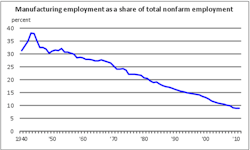The next blog on bringing the middle class back was meant to be a companion piece.
Harry Moser from Reshoring argued that the real culprit of lost manufacturing jobs was the offshoring craze. He referenced ITIF as a source without providing a link. I had forgotten about that organization. It is the The Information Technology & Innovation Foundation. I had found it while researching a similar topic 10 or 11 years ago. It bills itself as a think tank. As you know, most think tanks, much like some organizations in our space, publish research that just happens to support its point of view. The hot button I was researching back then was whether we needed more green cards issued to programmers as business leaders wanted, or whether we had plenty of programmers but we just didn't call them that.
Federal Reserve Economist
Some ideas I had developed over years. But others were highlighted by a talk I attended by William Strauss, Senior Economist and Economic Advisor, Federal Reserve Bank of Chicago.
Take a look at these slides.
About the Author
Gary Mintchell
Editor in Chief

Leaders relevant to this article:
